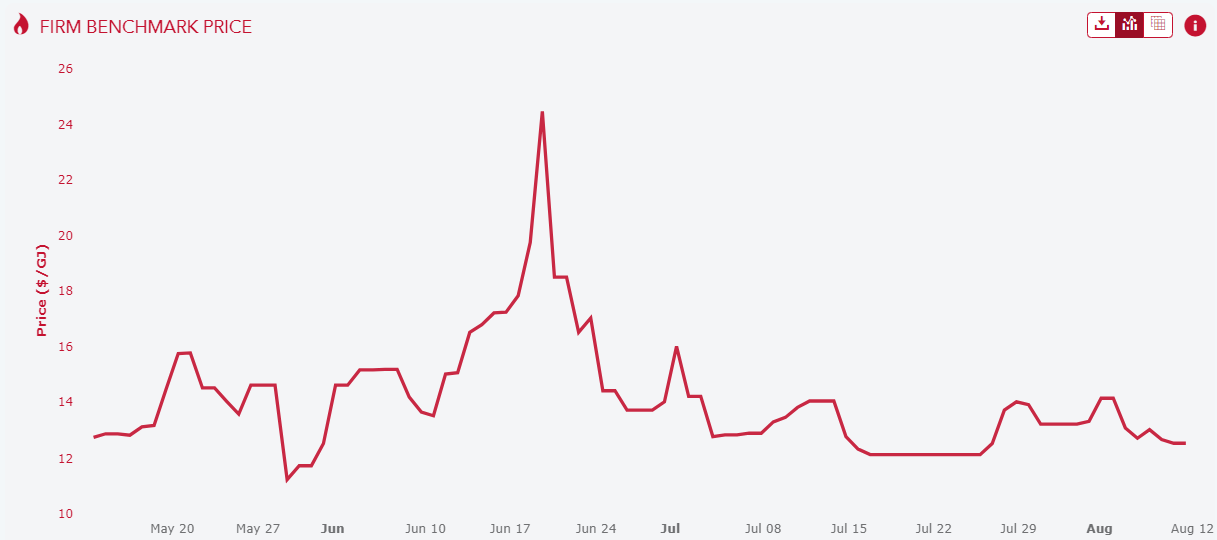Albo’s horror winter electricity shock just peaked at $193MW/h QMA:

That it passed virtually without comment from the MSM tells you how stupid this country’s media is.
The gas cartel is controlling prices to within an inch of Albo’s disastrous $12Gj price floor:

You are being spat on today:
Shell and PetroChina’s joint venture Arrow Energy will expand its Surat Gas Project as it moves to capitalise on growing demand.
The expansion will be welcomed by Australia’s energy industry, which is struggling to lock-in supplies amid rapidly depleting supplies across the country’s east coast.
Arrow said it will expand the project in Queensland’s Western Downs to produce 4000PJ of gas for the domestic market.
The JV said 450 new gas production wells, a new field compression station, 27km pipeline, and road and infrastructure upgrades over two phases will be developed.
Arrow’s chief executive Zhengxin Peng said first gas from the expansion has been targeted for 2026.
“At a time when more gas is needed for homes, businesses and industries, the SGP North development will solidify Arrow’s position as a major producer of natural gas on the east coast,” Mr Peng said.
The only thing Mr Peng doesn’t mention is that most, if not all, of those homes and businesses will be in China, not Australia.
The ACCC butchered Arrow when it had the chance to fix the east coast in 2015:
The Australian Competition and Consumer Commission has released a Statement of Issues on the proposed acquisition by Royal Dutch Shell (Shell) of BG Group (BG).
The Statement of Issues seeks industry views and more information on the competition issues that have arisen in the ACCC’s review to date.
“The ACCC is concerned that, by aligning Shell’s interest in Arrow Energy with BG’s LNG facilities in Queensland, the proposed acquisition may change Shell’s incentives such that it will prioritise supply to BG’s LNG facilities over competing gas users. As a result, Shell could choose to direct more (and possibly all) of Arrow’s large gas reserves towards meeting BG’s contracts to supply LNG export markets. This would remove some or all of Arrow’s gas from the domestic market,” ACCC Chairman Rod Sims said.
“Currently, Arrow has the largest quantity of uncommitted gas reserves in eastern Australia and there are a limited number of other potential suppliers to the domestic market. If the proposed acquisition resulted in less supply of gas to the domestic market, therefore, this could substantially lessen competition to supply domestic gas users and lead to higher domestic prices and more restrictive contractual terms.”
Then it bizarrely rolled over:
The Australian Competition and Consumer Commission will not oppose the proposed acquisition by Royal Dutch Shell (Shell) of BG Group (BG).
“The ACCC’s view is that the proposed acquisition would be unlikely to substantially lessen competition in the wholesale natural gas market, in either Queensland or eastern Australia more broadly,” ACCC Chairman Rod Sims said.
The ACCC considered whether the proposed acquisition would reduce the supply of gas, or reduce competition to supply gas, to domestic customers by aligning Shell’s interest in Arrow Energy with BG’s LNG facilities in Queensland.
“The ACCC concluded that as Arrow is not currently focussed on supplying domestic customers, and appears unlikely to be so in the future, aligning Arrow with an LNG operator would not change competition for the supply of gas to domestic customers,” Mr Sims said.
Sims gifted the Arrow gas reserve to the export cartel and we have been completely screwed ever since.

